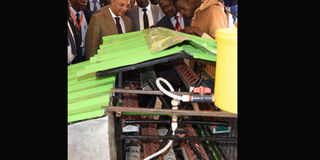Diary of a poultry farmer: What it takes to get Kebs certificate

The PS Vocational and Technical Training, Dr Kevit Desai and Rift Valley Technical Training Institute principal Edwin Tarno, among other guests view an automatic chicken feeder made by Kitale National Polytechnic during a recent exhibition. PHOTO | JARED NYATAYA | NMG
What you need to know:
- It is an offence under the Standards Act Cap 496 of the laws of Kenya to offer a product for sale without a valid standard mark of quality.
- As a medical doctor, I know that salmonella is a serious disease that can cause food poisoning in human.
- Another good thing I learnt is that when done properly, deep-litter bedding promotes the growth and multiplication of ‘good bacteria’’ which, in turn, prevents harmful pathogens.
Fidel, an ardent reader, wrote to me last week enquiring about an issue that many discerning farmers look forward to.
“I want to get a certification for my poultry farm. Please let me know what is required or the process needed.”
But he was not alone, Onyango, similarly, wrote: “Kindly collect your permit from Block C on the first floor.” I went to the Kenya Bureau of Standards (Kebs) offices in Nairobi’s South C and got mine.
A month or so ago, I had applied for the renewal of the permit. But before that, I’d received an e-mail from Eric, who works at Kebs.
“It is an offence under the Standards Act Cap 496 of the laws of Kenya to offer a product for sale without a valid standard mark of quality. We intend to suspend your permit from the database by end of February if you would not have renewed.”
I took immediate steps to renew the licence. I was required to submit the following documents — company certificate, PIN, a copy of my National ID card and I paid a fee of Sh11,500.
Unlike the last time when it took six months for an officer from the bureau to visit my Farm in Njiru, Nairobi, to collect samples — eggs and chicken — for analysis, this time it took only two weeks.
I was interested in the results for the eggs. If you recall, I’d changed the bedding for my chickens from common practice of shovelling the wood-shavings out of the chicken pen fortnightly to the so-called deep-litter method (also known as deep-bedding or built-up litter — Seeds of Gold, September 16, 2017).
I shared sometime back about my struggle to increase the shelf-life of eggs after customers started complaining that they were going bad. One expert told me, “Dirt on eggs may imply contact with chicken manure, which is a vehicle for transmitting salmonella.”
The option I had then was to wash the eggs in water. However, I was advised against that because it destroys the liquid coating called ‘cuticle’ or ‘bloom’ that is normally produced by the hen and which protects against ageing, and attack by bacteria.
Instead, I was told that in the unlikely event that an egg needs cleaning, warm water is preferred to cold, since the latter contracts the eggs drawing in dirty water — that may contain lethal bacteria — through the tens of thousands of invisible pores in the eggshell.
INFECTED RAW POULTRY PRODUCTS
As a medical doctor, I know that salmonella is a serious disease that can cause food poisoning in human. But then, I also learnt from the good vets who often visited my farm when I was dealing with disease outbreaks that fowl typhoid is a bacterial infection in the family of salmonella.
“Salmonellosis in birds presents in three different forms — as fowl typhoid, pullorum and as paratyphoid disease.”
Fowl typhoid causes high mortality in young unvaccinated birds. Therefore, I ensure that I vaccinate my chickens against fowl typhoid.
The vaccine is given as an injection in the muscle at week nine (see This is how to administer fowl typhoid vaccine at week nine available online).
Salmonella infections in humans occur when one consumes infected raw poultry products like eggs and meat or when human food is contaminated with faecal matter from infected chicken.
Vaccination, therefore, protects birds and humans against this disease.
What I’ve done to minimise contact between faecal matter and eggs is to change the wood shavings in the layer boxes every morning. I also advise the worker to ensure the eggs are picked as soon as they’re laid.
Another good thing I learnt is that when done properly, deep-litter bedding promotes the growth and multiplication of ‘good bacteria’’ which, in turn, prevents harmful pathogens.
“By not removing the manure often, good bacteria make it their home, eats and breaks down the droppings and devour the bad bacteria, leaving only the good ones.”
Now, when using deep-litter bedding, never apply chemical insecticides on the wood shavings as it will kill the beneficial micro-organisms that feed on bad bacteria, fungi and other harmful organisms, including coccidian parasites that cause bloody diarrhoea in chickens.
I am happy these measures have reduced the risk of dirt on eggs which can transmit the bacteria. The Kebs test results were positive. I picked my permit.





